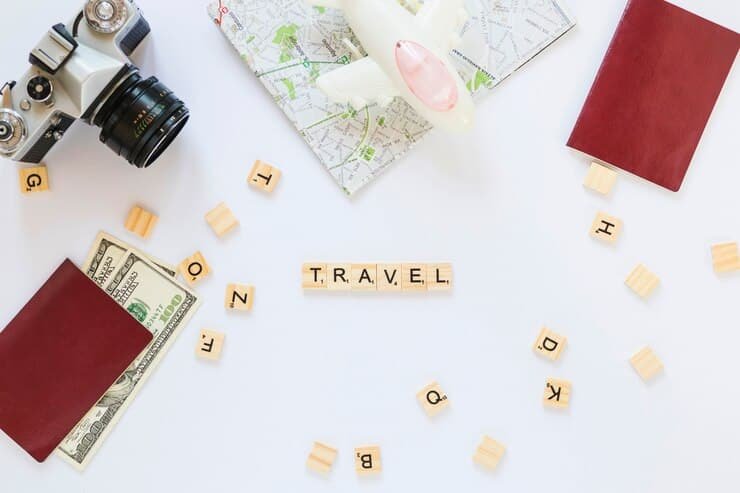Table of Contents
ToggleBudget Travel : Travelling is a dream for many, but the costs can often turn this dream into a distant fantasy. However, budget travel is not only possible but can also be incredibly rewarding. With the right strategies, you can explore new destinations, immerse yourself in different cultures, and create lasting memories without breaking the bank. This comprehensive guide covers essential tips and strategies to help you travel more while spending less.
Early Booking Advantages
One of the most effective ways to save money on travel is to plan ahead. Booking flights and accommodations early often results in significant discounts. Airlines and hotels tend to offer lower prices for early reservations to secure bookings well in advance. This is particularly true for peak travel seasons when prices can skyrocket closer to the date.
Fare Comparison Tools
Utilize fare comparison websites such as Skyscanner, Kayak, and Google Flights to compare prices across different airlines and travel dates. These tools allow you to set alerts for price drops, ensuring you get the best deals. Additionally, signing up for newsletters from airlines and travel deal websites can provide early access to special promotions and discounts.
Itinerary Planning
A well-thought-out itinerary can save both time and money. Researching your destination and planning activities in advance can help you identify free or low-cost attractions. It also allows you to schedule activities that are close to each other, reducing transportation costs.
Also Read : Top Civil Engineering Colleges In The USA 2024
Benefits of Off-Peak Travel

Traveling during off-peak seasons can save you a substantial amount of money. Tourist destinations are less crowded, and prices for flights, accommodations, and activities are generally lower. Off-peak travel also provides a more authentic experience, as you avoid the throngs of tourists that can detract from the local culture and ambiance.
Identifying Off-Peak Times
Research the best times to visit your desired destination when it’s not swarming with tourists. For example, Europe’s off-peak season is typically from late fall to early spring, excluding the holiday period. Southeast Asia is more affordable during the monsoon season, although you’ll need to be prepared for occasional rain.
Flexibility Equals Savings
Flexibility is key when it comes to budget travel. If you can be flexible with your travel dates, you can take advantage of the cheapest travel times. Similarly, being open to different destinations can help you choose the most affordable options without compromising on the experience.
Using Flexible Search Options
Many travel search engines offer flexible date search options. Websites like Skyscanner and Google Flights allow you to view prices over a range of dates, helping you identify the most economical travel days. Similarly, being open to alternative destinations can lead to unexpected adventures at a lower cost.
Budget Airlines
Budget airlines often offer lower fares compared to major carriers. While they might not provide all the luxuries, they can get you to your destination at a fraction of the cost. Airlines like Ryanair, EasyJet, and AirAsia are known for their budget-friendly fares. However, be aware of additional fees for baggage, seat selection, and other services.
Alternative Transportation Options
Consider alternative modes of transport like buses, trains, or carpooling services, which can be more economical. In Europe, for example, the extensive train network offers an affordable and scenic way to travel between cities. Websites like BlaBlaCar facilitate carpooling, allowing you to share rides with locals for a lower cost than renting a car or taking a taxi.
Budget-Friendly Lodging
Accommodation can be one of the largest expenses when traveling. Look for budget-friendly options such as hostels, guesthouses, vacation rentals, or even couchsurfing. Websites like Airbnb, Booking.com, and Hostelworld offer a variety of options that cater to different budgets. Hostels are particularly popular among budget travelers, offering dormitory-style rooms that are significantly cheaper than hotels.
Also Read : Land Your Dream Role With IIFT Exam Jobs
Alternative Accommodation Options

Consider alternative accommodation options like house sitting or home exchanges. Websites like TrustedHousesitters connect travelers with homeowners looking for someone to care for their home and pets while they are away. Home exchange platforms like HomeExchange allow you to swap homes with someone from another part of the world, providing free accommodation.
Benefits of Local Cuisine
Dining out can quickly add up, especially in touristy areas. Save money by eating like a local. Visit local markets, street food stalls, and inexpensive eateries. Not only will this help you stick to your budget, but it will also give you a more authentic taste of the local cuisine.
Grocery Shopping and Cooking
Another way to save on food expenses is by grocery shopping and cooking your meals. Many hostels and vacation rentals offer kitchen facilities, allowing you to prepare your meals. This can be a fun way to explore local ingredients and recipes, and it significantly reduces dining costs.
Exploring Without Spending
Many destinations offer a plethora of free activities. Research free museums, parks, walking tours, and cultural events. Exploring nature, strolling through local markets, or simply enjoying the city’s ambiance doesn’t cost a thing but can be incredibly rewarding. Websites like Meetup can help you find free or low-cost events and activities hosted by locals.
Volunteer Opportunities
Consider volunteering in exchange for accommodation and meals. Platforms like Workaway and WWOOF connect travelers with hosts offering room and board in exchange for work. This can be a rewarding way to immerse yourself in the local culture and save money on travel expenses.
Also Read : CTET Conqueror’s Handbook: Your Key To Educational Success!
Cost-Effective Travel
Instead of relying on taxis or rental cars, use public transportation to get around. Buses, trains, and metros are usually much cheaper and can give you a better sense of the local way of life. Many cities offer day passes or multi-day passes that provide unlimited travel for a fixed price.
Bike and Walking Tours
In addition to public transportation, consider biking or walking tours. Many cities have bike-sharing programs that allow you to rent a bike for a small fee. Walking tours, often available for free or for a small tip, are a great way to explore a city and learn about its history and culture from a local guide.
Benefits of Light Packing
Packing light can save you money on baggage fees and make your journey more comfortable. Aim to travel with carry-on luggage only and avoid unnecessary expenses. Packing efficiently also means you can move around more easily and avoid the stress of lugging around heavy bags.
Essential Packing Tips
Make a packing list and stick to it. Choose versatile clothing that can be mixed and matched, and consider doing laundry during your trip instead of packing more clothes. Use packing cubes to organize your belongings and maximize space in your luggage.
Earning and Redeeming Points
Sign up for travel rewards credit cards and loyalty programs to earn points on flights, accommodations, and other travel expenses. Accumulated points can be redeemed for free or discounted travel, allowing you to stretch your budget further. Programs like airline frequent flyer miles and hotel loyalty points can offer significant savings.
Also Read : Unlock Opportunities With PSU Exams Jobs
Maximizing Rewards

To maximize your rewards, focus on one or two programs to accumulate points faster. Use your travel rewards credit card for everyday purchases to earn points, and take advantage of special promotions and bonus offers. Additionally, consider using shopping portals associated with your loyalty programs to earn extra points on online purchases.
Research and Plan Your Destination
Before setting off on your budget adventure, thorough research is essential. Start by selecting your destination based on factors such as the cost of living, exchange rates, and overall affordability. Some regions are inherently more budget-friendly than others, offering excellent experiences at lower costs. Southeast Asia, Eastern Europe, and parts of Central and South America are renowned for being budget-friendly while providing rich cultural experiences.
Also Read : 10 Proven Strategies For Acing Defence Exams!
Booking Flights
When booking flights, timing is everything. Airlines often release their cheapest seats well in advance, so book as early as possible. Use flight comparison websites to monitor prices and set alerts for the best deals. Consider flying mid-week, as flights are generally cheaper on Tuesdays and Wednesdays. Additionally, red-eye flights (late-night or early-morning) tend to be less expensive due to lower demand.
Budget Airlines
Budget airlines can offer significant savings, but be sure to read the fine print. While the base fare may be low, budget airlines often charge for extras like checked baggage, seat selection, and in-flight meals. Pack light to avoid baggage fees and bring your own snacks to save money on food.
Accommodation
Accommodation is another major expense, but there are many ways to save. Hostels are a popular choice for budget travelers, offering dormitory-style rooms at a fraction of the cost of hotels. Many hostels also have private rooms for a bit more privacy. Vacation rentals, such as those found on Airbnb, can be a cost-effective option, especially for longer stays or when traveling with a group.
Alternative Accommodation Options
House sitting and home exchanges are excellent ways to secure free accommodation. TrustedHousesitters connects travelers with homeowners looking for someone to care for their home and pets while they are away. HomeExchange allows you to swap homes with someone from another part of the world, providing free lodging and a unique local experience.
Public Transportation
Public transportation is often the most economical way to get around a city. Many cities offer comprehensive public transit systems, including buses, trams, and metros. Day passes or multi-day passes can provide unlimited travel for a fixed price, offering significant savings compared to single tickets.
Biking and Walking
Biking and walking are excellent ways to explore a new destination while saving money. Many cities have bike-sharing programs that allow you to rent a bike for a small fee. Walking tours, often available for free or for a small tip, are a great way to see the sights and learn about the local culture from a knowledgeable guide.
Car Rentals and Ride-Sharing
If you need a car, consider renting from a budget car rental company or using a ride-sharing service like BlaBlaCar. Ride-sharing allows you to share the cost of a trip with other travelers, making it a more affordable option than renting a car on your own. Additionally, many cities offer car-sharing programs where you can rent a car by the hour or day, providing flexibility and savings.
Local Markets and Street Food
Eating like a local is one of the best ways to save money on food while traveling. Visit local markets to buy fresh produce, snacks, and ingredients for home-cooked meals. Street food is another budget-friendly option, offering delicious and authentic dishes at a fraction of the cost of a restaurant meal.
Cooking Your Own Meals
If your accommodation has kitchen facilities, take advantage of the opportunity to cook your own meals. This can be a fun way to explore local ingredients and recipes while saving money. Even if you don’t have a full kitchen, many hostels and vacation rentals offer shared kitchen spaces where you can prepare simple meals.
Budget-Friendly Restaurants
When dining out, look for budget-friendly restaurants and eateries. Avoid touristy areas where prices are often inflated. Instead, seek out local favorites and hidden gems where the food is delicious and reasonably priced. Apps like Yelp and TripAdvisor can help you find highly-rated, budget-friendly dining options.

Exploring Nature
Many of the best travel experiences are free. Exploring nature, whether it’s hiking in a national park, swimming in a lake, or strolling along a beach, is often completely free and incredibly rewarding. Research outdoor activities and natural attractions in your destination to find budget-friendly adventures.
Museums and Cultural Sites
Many museums and cultural sites offer free admission on certain days or times. Research these opportunities in advance to plan your visits accordingly. Some cities also offer free walking tours, where local guides provide insightful tours in exchange for a small tip.
Local Events and Festivals
Local events and festivals are another great way to experience the culture of a destination without spending a lot of money. From street fairs and markets to free concerts and parades, there are often many free or low-cost events happening in cities around the world. Check local tourism websites and event calendars to find out what’s happening during your visit.
Creating a Budget
Creating a detailed budget before you travel is essential for managing your expenses. Start by estimating the cost of major expenses such as flights, accommodation, and transportation. Then, allocate a daily budget for food, activities, and other expenses. Be realistic about your spending and include a buffer for unexpected costs.
Tracking Your Spending
Once you’re on the road, track your spending to ensure you stay within your budget. Use a budgeting app or a simple spreadsheet to record your expenses each day. This will help you stay accountable and make adjustments as needed to avoid overspending.
Saving on Travel Essentials
In addition to saving on major expenses, look for ways to cut costs on travel essentials. For example, bring a reusable water bottle and refill it to avoid buying bottled water. Pack snacks for long journeys to avoid overpriced airport or train station food. And don’t forget to bring a travel-sized first aid kit to avoid costly medical expenses.
Eco-Friendly Travel Tips
Budget travel and sustainable travel often go hand-in-hand. Traveling light, using public transportation, and eating local foods are all budget-friendly strategies that also reduce your environmental impact. Additionally, consider staying in eco-friendly accommodations and supporting local businesses to make your travels more sustainable.
Reducing Your Carbon Footprint
There are many ways to reduce your carbon footprint while traveling. Choose direct flights whenever possible to minimize emissions from takeoffs and landings. Use public transportation or bike instead of renting a car. And opt for eco-friendly activities like hiking, biking, and wildlife watching instead of energy-intensive attractions.
Safety Tips
Traveling on a budget doesn’t mean compromising on safety. Follow basic safety tips such as keeping your valuables secure, staying aware of your surroundings, and avoiding risky areas. Research the safety of your destination and take necessary precautions to stay safe.
Travel Insurance
Investing in travel insurance is a smart way to protect yourself from unexpected expenses such as medical emergencies, trip cancellations, and lost luggage. While it may seem like an added expense, travel insurance can save you money in the long run by covering costly emergencies.
Conclusion
Traveling on a budget doesn’t mean you have to compromise on the quality of your experience. By planning ahead, being flexible, and making smart choices, you can explore more of the world while spending less. Whether you’re a seasoned traveler or embarking on your first adventure, these budget travel strategies will help you make the most of your journey without breaking the bank. So pack your bags, follow these tips, and get ready to discover new destinations without the hefty price tag.
FAQs
Q1: Is budget travel safe?
Yes, budget travel can be safe as long as you research and plan ahead. Stay in reputable accommodations, use trusted transportation options, and be aware of your surroundings.
Q2: How can I find cheap flights?
Use flight comparison websites, set price alerts, and book in advance. Being flexible with your travel dates and destinations can also help you find cheaper flights.
Q3: What are some budget-friendly destinations?
Countries in Southeast Asia, Eastern Europe, and Central America are known for being budget-friendly while offering rich cultural experiences and beautiful landscapes.
Q4: Can I still enjoy luxury on a budget?
Yes, you can enjoy luxury experiences by looking for deals and discounts. Consider staying in budget accommodations and splurging on a few luxury experiences like a nice dinner or a special activity.
Q5: How do I manage my travel budget?
Create a detailed budget before you travel, including all expected expenses. Track your spending during the trip and adjust your activities and spending accordingly to stay within your budget.
Q6: What are some tips for finding affordable accommodation?
Look for budget-friendly options such as hostels, guesthouses, and vacation rentals. Consider alternative accommodation options like house sitting or home exchanges for free lodging.
Q7: How can I save on food expenses while travelling?
Eat like a local by visiting local markets, street food stalls, and inexpensive eateries. If your accommodation has kitchen facilities, cook your own meals to save money.





